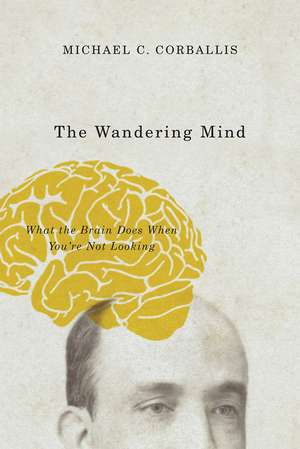The Wandering Mind: What the Brain Does When You're Not Looking
Autor Michael C. Corballisen Limba Engleză Paperback – 28 oct 2016
If we’ve done our job well—and, let’s be honest, if we're lucky—you’ll read to the end of this description. Most likely, however, you won’t. Somewhere in the middle of the next paragraph, your mind will wander off. Minds wander. That’s just how it is.
That may be bad news for me, but is it bad news for people in general? Does the fact that as much as fifty percent of our waking hours find us failing to focus on the task at hand represent a problem? Michael Corballis doesn’t think so, and with The Wandering Mind, he shows us why, rehabilitating woolgathering and revealing its incredibly useful effects. Drawing on the latest research from cognitive science and evolutionary biology, Corballis shows us how mind-wandering not only frees us from moment-to-moment drudgery, but also from the limitations of our immediate selves. Mind-wandering strengthens our imagination, fueling the flights of invention, storytelling, and empathy that underlie our shared humanity; furthermore, he explains, our tendency to wander back and forth through the timeline of our lives is fundamental to our very sense of ourselves as coherent, continuing personalities.
Full of unusual examples and surprising discoveries, The Wandering Mind mounts a vigorous defense of inattention—even as it never fails to hold the reader’s.
That may be bad news for me, but is it bad news for people in general? Does the fact that as much as fifty percent of our waking hours find us failing to focus on the task at hand represent a problem? Michael Corballis doesn’t think so, and with The Wandering Mind, he shows us why, rehabilitating woolgathering and revealing its incredibly useful effects. Drawing on the latest research from cognitive science and evolutionary biology, Corballis shows us how mind-wandering not only frees us from moment-to-moment drudgery, but also from the limitations of our immediate selves. Mind-wandering strengthens our imagination, fueling the flights of invention, storytelling, and empathy that underlie our shared humanity; furthermore, he explains, our tendency to wander back and forth through the timeline of our lives is fundamental to our very sense of ourselves as coherent, continuing personalities.
Full of unusual examples and surprising discoveries, The Wandering Mind mounts a vigorous defense of inattention—even as it never fails to hold the reader’s.
Preț: 150.97 lei
Nou
Puncte Express: 226
Preț estimativ în valută:
28.89€ • 30.24$ • 24.04£
28.89€ • 30.24$ • 24.04£
Carte tipărită la comandă
Livrare economică 31 martie-14 aprilie
Preluare comenzi: 021 569.72.76
Specificații
ISBN-13: 9780226418919
ISBN-10: 022641891X
Pagini: 184
Ilustrații: 1 halftone
Dimensiuni: 152 x 229 x 18 mm
Greutate: 0.25 kg
Ediția:1
Editura: University of Chicago Press
Colecția University of Chicago Press
ISBN-10: 022641891X
Pagini: 184
Ilustrații: 1 halftone
Dimensiuni: 152 x 229 x 18 mm
Greutate: 0.25 kg
Ediția:1
Editura: University of Chicago Press
Colecția University of Chicago Press
Notă biografică
Michael Corballis is professor emeritus of psychology at the University of Auckland, New Zealand, and the author of many books, including A Very Short Tour of the Mind: 21 Short Walks around the Human Brain.
Recenzii
"The Wandering Mind is a pleasure to read--a lively book that will appeal to a broad spectrum of readers."
“We spend at least half of our lives off-task, our minds wandering into distant, imaginary worlds. We’re taught from a young age that this is a bad habit. But Corballis argues that mind wandering isn’t just important for creativity—it’s an essential part of what makes humans unique.”
“Touching on daydreaming, remembering and subconsciously planning for the future, Corballis suggests that the brain is designed for unfocused functionality. . . . Engaging.”
"Michael Corballis, the scientist, takes you by the hand and weaves through an avalanche of information from psychology, literature, history, and more to elucidate my favorite mental state--mind wandering. His high capacity for erudition, lucidity, and warmth have never shined more brightly."
"Book of the Week. . . . Conversational, sincere, and amusing. . . . Engaging."
“Although The Wandering Mind is a conversational essay, it doesn’t wander. Corballis distills to essentials. Memory, thinking about the future, reading other people, storytelling, dreams, hallucinations, and creativity each get a chapter.”
“Corballis argues that mind wandering isn’t just important for creativity—it’s an essential part of what makes humans unique.”
















